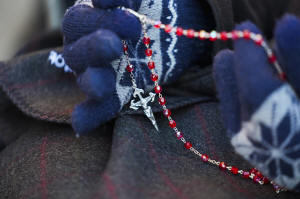These nuns advocated for immigrant rights for 40 years — now in their
90s, they’re not slowing down
[March 06, 2025]
By JESSIE WARDARSKI
CHICAGO (AP) — At age 90 and 95, this Catholic nun dynamic duo have been
“peacefully and respectfully” fighting for immigrant rights for over 40
years. And they never take no for an answer.
Faced with the latest moves by the Trump administration, which has
challenged the sanctuary of churches, begun stripping some immigrants of
their temporary protected status and halted funding for refugee
resettlement programs, they plan to continue protesting as long as God
gives them the strength.
“We believe everybody deserves to be treated with dignity and respect,”
said Sister JoAnn Persch, 90.
As she sat next to Sister Pat Murphy, 95, in their two-bedroom apartment
in Alsip, a suburb south of Chicago, her voice broke. “To hear the
verbiage, what they call immigrants, it’s just very hard,” she said.
“We’re worried and our families are very worried.”
After the COVID-19 pandemic eased, the sisters were on the verge of
retirement. That changed in 2022 when thousands of immigrants were bused
from the U.S.-Mexico border to Chicago; they felt called back into
action.
The sisters initially took in one family — a single mother from Sierra
Leone with five children. But the need was great. Soon after, the
sisters had 17 apartments filled with 17 asylum-seeking families and a
new nonprofit to fund the ongoing operation, known as Catherine's Caring
Cause.
They’ve housed 25 families over the past three years — paying rent and
utilities for a year, offering food assistance, providing connections to
legal help.

Zuleika, who arrived with her husband, Oscar, and son Josafat, 14, just
over a year ago, squeezed Murphy with a gentle, lengthy hug during a
recent visit to the sisters’ apartment.
Zuleika and Oscar recalled the threats made to their family and their
challenging decision to flee Central America for the United States. Out
of fear for their personal safety, they spoke on the condition The
Associated Press would only use their first names.
Once in Chicago, they stayed in a migrant shelter for about six months
before finding Catherine’s Caring Cause.
“Their impact on our lives has been really big, huge,” said Oscar of the
sisters.
“They picked us up with all our belongings. They took us to the
apartment. They furnished it, they gave us food.”
The sisters have even accompanied them to court, Oscar said.
And they’ve grown close, bonding over their shared Christian faith.
“This was not a coincidence. This was God who allowed that meeting and
for them to help us with everything we’ve been through,” Oscar said.
Each family aided by CCC has applied for asylum, which must be filed
before the one-year anniversary of their border crossing. Most, like
Zuleika and Oscar, have their work permits, which can only be applied
for five months after filing for asylum.
And although these families have taken the necessary steps to be in the
country legally, there is still fear.
“With everything we’re seeing ... even someone with asylum is a little
afraid on the street,” Oscar said.
Before Trump’s inauguration, it was announced that Chicago would be
“ground zero” for raids and deportation. The sisters and other local
faith organizations handed out “know your rights” packets and cards in
both English and Spanish. Trainings were held at local churches and via
Zoom.
In the first weeks of the new administration, the sisters said many of
their families kept children home from school and avoided going to work.
The sisters told many of them to avoid attending church.

“We told our families we’re preparing you for the worst. But we’re
hoping and praying for the best,” Persch said.
On a recent frigid Friday morning, Sister JoAnn sat outside the entrance
of the Immigration and Customs Enforcement staging and processing center
in Broadview, Illinois. Covered with a thin blanket, she clutched her
red rosary beads with gloved hands, smiling widely.
She and roughly 20 other people — including union activists, lawyers and
members of the Chicago Archdiocese — gathered at the facility for a “day
of prayer,” an act of defiance and advocacy she and Murphy have done for
over two decades.
“Friday is the day of deportation for many,” said immigration lawyer
Royal Berg, who started the prayer gathering in the early 2000s.
A large photo of Our Lady of Guadalupe hung from the metal railing of a
wheelchair ramp behind the group. Their combined breath shone in the
morning light as they formed a tight oval around Sister JoAnn, who spoke
briefly before the prayer.
[to top of second column]
|

Sister JoAnn Persch, 90, a nun with the Sisters of Mercy, holds a
rosary as she prays with others during a vigil outside a United
States Immigration and Customs Enforcement detention facility
Friday, Feb. 21, 2025, in Broadview, Ill. (AP Photo/Erin Hooley).

“We got to keep in the struggle. This is a unique time, and we’re
all needed,” she said, her right hand clenched in a fist.
They started promptly at 7:15 a.m. and for the next 20 minutes
prayed the rosary in English and Spanish, chanted, “Sí se puede!” in
unison and sang “We Shall Overcome.”
Persch and Murphy met in the 1960s while opening a Catholic school
in Wisconsin as young nuns with the Sisters of Mercy. In their early
days, they bonded over the grunt work they were assigned, their
desire to help people in need, and a familiar song they learned in
high school, “For Christ the King."
It was only a year later that they were separated, Murphy moving to
Peru and Persch to Chicago. Years later they had both shed their
cumbersome habits, but not the habit of helping those less
fortunate. This was the beginning of their long-lasting partnership.
“To have a team that had the same values, same drive and you can
bounce things off. ... That’s been extremely helpful,” said Persch,
crediting teamwork for much of their success.
Through the decades, they’ve been arrested for peacefully protesting
in Washington as “Catholics for Dreamers,” for the migrant children
dying in detention camps, and in front of a nuclear test site in
Nevada.
They’ve even helped change state law, partnering with the Illinois
Coalition for Immigrant and Refugee Rights on a bill that would
allow religious workers into detention facilities and jails. This
eventually led the state to block jails from working with
Immigration and Customs Enforcement.
In February, the Trump administration sued the city of Chicago as
part of its recent crackdown on so-called sanctuary cities. Chicago
has some of the nation’s strongest laws limiting cooperation between
local police and federal immigration agents, making it a target.
“Ours was a ministry of presence,” Persch said. The sisters and
fellow volunteers would pray with those detained in places like
McHenry County Jail in Illinois, eventually traveling to Wisconsin
to do the same work. They often put $10 in commissary accounts and
would pass information to families on the outside.

Their work has also inspired organizations like Viator House of
Hospitality, a home for young men ages 18 to 25 who fled their
homelands alone because of violence.
“We provide them with opportunities for education, medical, mental
health treatment. We make sure each kid has a lawyer,” said Corey
Brost, a priest and executive director of Viator House.
Bethany House of Hospitality was started shortly after, providing
similar services for young women.
"Sisters Pat and JoAnn are like the grandmothers of Viator House,”
said Brost, who helped co-found the nonprofit with Brother Michael
Gosch in 2017. Gosch had previously worked with the sisters at Su
Casa Catholic Worker, where they aided survivors of torture from
Central America.
“Their spirit fills this program and everything we do,” Brost said.
As they look to the future, the sisters continue to be led by
Scripture, like Matthew 25:35, which includes, “I was a stranger,
and you invited me in.”
They’re motivated by the advocacy of Pope Francis, recalling his
message that the immigrant “is your brother. You can’t just walk
past him. You have to respond.”
And they’re inspired by young people.
In recent weeks, they spoke with students at Mount Carmel High
School, an all-boys Catholic school in Chicago.
Persch recalled being asked, “At your age, what keeps you going?” To
which she responded, “If not us, who? If not now, when? This is our
family. So, when one part of the family’s hurting, we’re all
hurting.”
The sisters no longer oversee some of the organizations they
started. But the work continues through mentors, volunteers and
trained staff.
As for Catherine’s Caring Cause, they have no doubt that it will
continue once they no longer can.
“I’m not worried at all about that,” Persch said. “I’m worried about
the future of immigration. Period.”
___
AP journalist Melissa Perez Winder contributed to this report.
All contents © copyright 2025 Associated Press. All rights reserved |